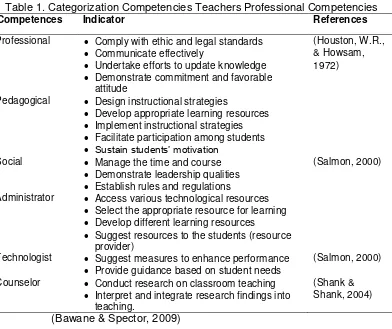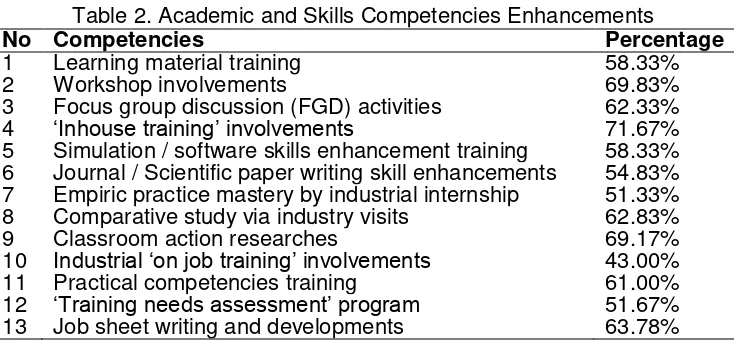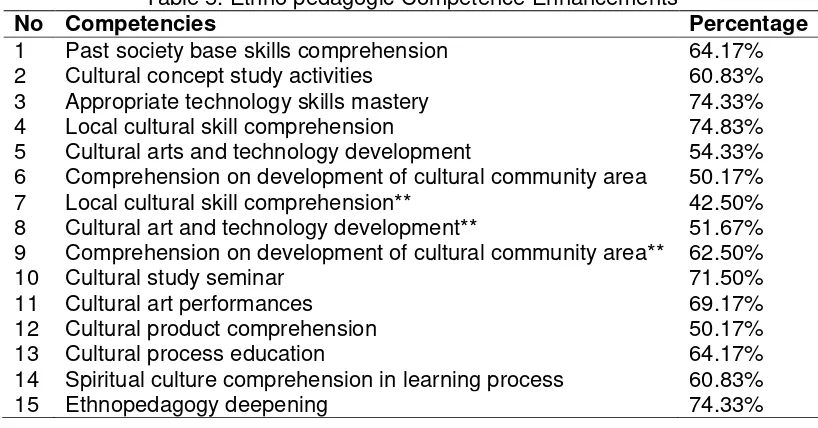Innovation of Vocational Technology Education
Available online at http://ejournal.upi.edu/index.php/invotec
Continuing Professional Development a Vocational
Education Teacher in West Java
Yadi Mulyadi, Sumarto & Johar Maknun
Universitas Pendidikan Indonesia, Indonesia
___________________________________________________________________________________________________________________________________
A R T I C L E I N F O A B S T R A C T
Continuous professional development of vocational teachers is a strategic effort to increase the competence of professional vocational teachers in a planned and structured. Professional vocational teachers have mastery of competencies demands a comprehensive multi-dimensional. Competency professional standards based on juridical regulation, which includes professional competence, personal competence, social competence and ped-agogical competence. Multi-professional competence of vocational teachers increasingly complex, because the substance of technological and vocational extremely varied and has very wide dimensions. The dynamics of technological and vocational education has a high acceleration, in line with the development of business and industry. The substance of the subject matter and learning model developed adaptive and portable, so as to synchronize the changes that occur. This paper will identify a comprehensive identity-based teacher professional culture-based model 'Raymond Gagnon'. Teacher professional identity associated with the technical efforts undertaken vocational teachers in West Java in an effort to improve the mastery of basic prerequisite's professional teacher competency standards. Descriptive analysis was conducted to describe the specific technical efforts in improving professional skills had been done, either individually, or in groups of formal institutions. The final result can be seen mapping profile in a structured continuous professional development and conceptual provide strategic impact to the renewal of knowledge and the improvement of teaching practices in the classroom teacher. Implications of the study of the issue of continuing professional development provide a conceptual input to various relevant parties on the professional development of vocational teachers in a more comprehensive, systemic and structured.
Article history:
Received 27 December 2016 Received in revised form 11 January 2017
Accepted 30 January 2017 Available online 28 February 2017
Keywords:
Continuing development Vocational teacher Teacher competency
1. Introduction
The process of continuous professional development through various activities, activities the program, training course, interns and various other activities done by teachers excavated and analyzed compre-hensively providing competency improvement professional vocational teachers. Learn throughout the life of the main need for all and especially for those who have a direct task the development of education in school teachers. Competency Improvement teachers will give impact to the growth of wealth and the success of the educational institutions. Specifically for vocational education challenges to the front of the far more serious because vocational education has the diversity of jobs and industry. Vocational Education challenges to the future of not only in the local territorial dimension, national and regional, but also has a time dimension that goes to the fore with the condition continue to be dynamically changed. For professional teachers, vocational education sector is very important to maintain and renew the skills and knowledge in order to resolve the dynamics of the multi-dimensional world of work with the pattern of reform and competition which continues to increase. Therefore vocational education system must have the structure of the development of human resources is adequate and effective (Simons & Snewin, 2001)
Many factors that affect the capability and the capacity of the vocational teacher’s competencies, but in
research is only four components that will be analyzed. The first variable associated with the substance of the commitment competency improvement of academic skills and was a reflection of the efforts by vocational teachers in improving competently scholarly competence both in the concept of the the oretical and practical aspects of skill and industry. Extensive individual experience as vocational teachers and work experience in the industry is part of a partial section became an important component in improving the professional capabilities (Köpsén, 2015). General knowledge of teachers in the context of professional development related to the capacity of the implementation of tactical and strategic tasks. Investigation of the knowledge of the teacher to identify the elements of the general public so that they can perform complex tasks and specifically including from the point of view of the methodology. Therefore the understanding of the knowledge of the vocational teachers useful to improve the education of teachers and education innovation that more successful.
The second variable related to the improvement of pedagogy competency which is the main instrument in the development of learning learners in all units both in the classroom and laboratory, studio and workshop. The mastery of pedagogy competency there in includes the ability lesson plan is based on the mastery of the rules pedagogy and the structure of the curriculum (E. Smith, 2009). The third variable that gives the influence of professional vocational teachers abilities is competency improvement personality a professional vocational teachers. The argument from the perspective of the personality of the teachers are still dichotomizes on the one side of the opinion that the good teacher is born but on the other hand, there are also holds the ideal teachers should be formed and through the process of the construction of the long term. Compromise the best personality teachers who qualify ideally have talents and then developed professionally through various competency improvement program (Olorundare, 2003). The fourth variable associated with competency improvement ethno pedagogy professional vocational teacher. The system of cultural and social education is the two sides of the currency to one another cannot be separated routine social community, development, and amendments there to be the value system of life that will be the content of the knowledge. Professional teachers should become a successor to the professional cultural at delivery lessons in class (Marielle Anne Martinet & Danielle Raymond, 2001). Professional vocational teachers need strengthening comprehensive about the principles of pedagogy will be the investment in developing the learning process, the transfer of knowledge and values of life. Education vocational technology has its own pedagogy characteristics because it contains the value system of the formation of human resources in the form of labor skilled personnel rele-vant to the industry and understands the value system of the social and cultural society.
2. Continuing Professional Development for Vocational Teacher
big part of competency 'threshold competencies' namely basic skills that belong to the individualized in doing a work in order to achieve the goal of minimum and 'differentiation competencies' namely the competencies possessed by each person that one another different functional (Lyle M. Spencer, Jr., 1993). Another definition of the competencies stated that the competencies are the characteristics or the ability of the individually in performing certain specific actions, causing more effective performance (Nikolaou, 2003). The competence inherent more powerful because individually perform actions that are repeated continuously on a certain job and become more effective (Sparrow, 1995). Besides that in the context of social professional vocational teachers should understand the rule of law and ethics that exists in the environment a healthy society. Therefore structurally SMK teacher’s professional competencies can be formulated as follows:
Table 1. Categorization Competencies Teachers Professional Competencies
Competences Indicator References
Professional Comply with ethic and legal standards Communicate effectively
Administrator Access various technological resources Select the appropriate resource for learning Develop different learning resources
Suggest resources to the students (resource provider)
Technologist Suggest measures to enhance performance Provide guidance based on student needs
(Salmon, 2000)
Counselor Conduct research on classroom teaching Interpret and integrate research findings into
teaching.
(Shank & Shank, 2004)
(Bawane & Spector, 2009)
Sustainable professional development includes learning, training, improving the skills and knowledge of industrial environments become great obligation a teacher professional. The learning process provides a great opportunity to increase capacity to integrate new experience and adapt to the new situation. Even in certain scale competency improvement will be able to change, maintaining and improving the skills, knowledge and positive attitude toward social and cultural society. The changes will involve the growth of personality, the actualization of themselves, development professionally improving the skills of the acquisition of knowledge as well as the development of creativity (Medelañonuevo, Ms. Carolyn, Ohsako, T. & Mauch, 2001). One of the primary domain in developing the professional teacher is to improve professional competence.
sustainable professional de-velopment is one activity which fragmented, is cherent that 'decontextualized' and isolated from the situation real class (Ball & Cohen, 1999; Ono & Ferreira, n.d; Desley Hargreaves, 2000; Villegas-Reimers, 2003)
3. Methodology
The main objectives of the methodology this research is to identify the influence of competency im-provement and self-efficacy level professional teachers against the formation of a professional teacher identity. Distribution based on the type of research, this research including descriptive and verification namely gain a comprehensive research variable characteristics and measure the relationship between the variables through the hypothesis test procedure. The method developed is quantitatively related to the social issues or human done based on testing the theory that consists of the variables and measured with numbers and through the procedures of statistical analysis in order to discover whether the predictive generalizations of the theory is really. The population of this research is SMK teachers with expertise of power electricity field that has obtained a certificate of professional the expertise and located in the area of West Java. Based on the main data SMK, the number of SMK in the field of the expertise of power electricity in West Java 106 SMK that consists of 30 smk and 76 SMK Private (Data Subject SMK: 2014). When the assumption of the amount of SMK teachers each school that has got the professional certificate is ten people then the population number is 765.
4. Result and Discussion
Based on research towards 120 vocational school teachers across West Java, resulting in increment of every competencies enhancement variables as following:
4.1 Academic and Skills Competencies Enhancements
Academic and Skills Competencies Enhancements variable measure results have 13 indicators with percentage variations showing enhanced competencies of vocational school teachers.
Table 2. Academic and Skills Competencies Enhancements
No Competencies Percentage
1 Learning material training 58.33%
2 Workshop involvements 69.83%
3 Focus group discussion (FGD) activities 62.33%
4 ‘Inhouse training’ involvements 71.67%
5 Simulation / software skills enhancement training 58.33% 6 Journal / Scientific paper writing skill enhancements 54.83% 7 Empiric practice mastery by industrial internship 51.33% 8 Comparative study via industry visits 62.83%
9 Classroom action researches 69.17%
10 Industrial ‘on job training’ involvements 43.00%
11 Practical competencies training 61.00%
12 ‘Training needs assessment’ program 51.67%
13 Job sheet writing and developments 63.78%
Table 2 shows the variable indicator improvement of academic competence and skills namely profes-sional vocational teacher’s activities in the improvement of academic competence and skills. On this indicator the highest achievements related to the activities of SMK teachers who follow the training 'Inhouse Training' of 71,67%. Massive quantity value shows that the SMK teachers more follow the activities held in schools by inviting various resource persons from outside the especially industry. The lowest indicator achievements there on the sub an internship in the industry of 51,33%. This figure is worrying because vocational teachers are very few who have an internship in the industry relevant with having the skills.
4.2 Profile of Pedagogic Competency Improvement
Discussion (FGD), increased mastery of writing skills and material content development training learning model. Four profile measurement results the indicator can be checked on table 3.
Table 3. Pedagogic Competence Enhancements
No Competencies Percentages
1 Learning methodology training 62.83%
2 Facilitator and mentor in group activities 57.67% 3 Competence and learning material content development 74.50%
4 Learning model and process planning 84.00%
5 Innovative scientific work 60.00%
6 Classroom problem-solving studies 69.67%
7 Learning multimedia developments 66.30%
8 RPP and learning material reviews 83.60%
Table 3 shows gains variable indicator improvement of pedagogy competency. Model planning activities and learning process occupy the first rank of 84,00%. A large number that shows the SMK teachers are always doing the efforts to increase the mastery of models with the latest learning as part of the effort to the improvement of the learning process in the classroom or in the laboratory. While the lowest level obtained related to SMK teachers activities in the development of group activities only reach 57,67%. Collaboration between the teachers of a kind or one type lesson material substance has not become the main choice sustainable professional development.
4.3 Improving the Competence Personality Leadership
Competency Improvement personality leadership is part of the competency standard is required for a teacher professional. Personality competence related to personal capability in developing them comprehensively became a teacher. The measurement result variables competency improvement personality include leadership training activity indicator communication, training personality, formed atmosphere democratic class, training education psychology, construction of the student and religious activities in the school environment.
Table 4. Personality Competencies Enhancement
No Competencies Percentages
1 Public Communication skill 54.20%
2 Personality and mental enhancement training 78.00% 3 Psychology education concept mastery 79.67%
4 Democratized learning 52.00%
5 Student personality development and guidance 67.17% 6 Religious activity in school premise 70.00%
4.4 Competency Improvement Ethno Pedagogic
Measurement results competency improvement ethno pedagogy that cover local cultural understanding indicator community, concept review the culture and improvement of the understanding of the appropriate technology skills and other variables can be checked on table 5.
Table 5. Ethno pedagogic Competence Enhancements
No Competencies Percentage
1 Past society base skills comprehension 64.17%
2 Cultural concept study activities 60.83%
3 Appropriate technology skills mastery 74.33%
4 Local cultural skill comprehension 74.83%
5 Cultural arts and technology development 54.33% 6 Comprehension on development of cultural community area 50.17%
7 Local cultural skill comprehension** 42.50%
8 Cultural art and technology development** 51.67% 9 Comprehension on development of cultural community area** 62.50%
10 Cultural study seminar 71.50%
11 Cultural art performances 69.17%
12 Cultural product comprehension 50.17%
13 Cultural process education 64.17%
14 Spiritual culture comprehension in learning process 60.83%
15 Ethnopedagogy deepening 74.33%
The research results show the competencies ethno pedagogy on the table 5 have achievement percentage indicator is very different. The measurement result indicators increased the understanding of the skills of the local cultural skills based on the culture and the understanding of the development of the local community to reach the highest number of 74,83% a significant number achievements. Job skills based on the local culture is closely related to the condition of the local culture that attention to environmental aspects of society, historical and social interaction. The indicator improvement activities mastery of the concept of the culture it is lower again only reach 42.50%. This figure shows the scientific activities SMK teachers professional on the material content with all aspects of the culture is still very less. The understanding that the social aspects of the culture has a strong correlation with the ability to teach and educate students in the learning process has not been internalized. The understanding of the concept of the culture of the society will provide a stronger learning nuance, different atmosphere of familiarity even though in the process of learning material content technology.
5. Conclusion
Professional vocational teachers, in general, have been doing competency improvement activities the professionalism of teachers that includes academic and skills, personality, pedagogic skills and ethnopedagogy individually as well as institutional arrangements various structured training. The four competency improvement activities developed by the vocational education teacher quantitative and qualitative research has a significant contribution in the form of professional teacher identity profile competency improvement activities pedagogic skills, have the most influence and then followed by the competency improvement personality, increased competencies and academic skills and is competency improvement ethno pedagogy.
Academic competency improvement activities and skills, pedagogy, personality and ethno pedagogy need to be upgraded in a broader and more massive under the coordination of the relevant government agencies directly. The percentage of achievement of competency improvement activities conducted by
SMK teacher’s professional the average has not yet reached the value of the above 80%.
References
Bawane, J. & Spector, J.M. 2009. Prioritization of online instructor roles: implications for competency‐based teacher education programs.
Gagnon, R. 2002. Teacher Training in Vocational Education. Ministere de I’Education Gouvernement Du Quebec.
Houston, W.R. & Howsam, R.B. 1972. Competency-based teacher education: Progress, problems, and prospects. Science Research Associates
Lyle M., Spencer, Jr. & S.M.S. 1993. Competency at Work. New York: Wiley.
Krathwol. 2002. A Revision of Bloom’s Taxonomy: An Overview. Theory Into Practice OHIO University
Journal 41(4): 213–218.
Köpsén, P.A. & S. 2015. Continuing Professional Development of Vocational Teachers: Participation in a National Initiative in Sweden. Publisher : Springer 7(1): 7.
Marielle Anne Martinet, D.R. & C. G. 2001. Teacher Training Orientations Professional Competencies.
Ministere de I’EducationGouvement Du Quebec, 17–26.
Nikolaou, L. 2003. The Development and Validation of a Measure of Generic Work Competencies. International Journal of Testing 3(4): 309–319.
Olorundare, S. 2003. The Teaching Profession Ethics and Problem. In Published Ilorin University (pp. 1– 13).
Shank, P. & Shank, P. 2004. Competencies for online instructors. Denver, CO: Learning Peaks, LLC. Retrieved February, 1–3. Retrieved from http://scholar.google.com/scholar?hl=en&btnG
Smith, E. 2009. Teacher, Instructors and Trainers : an Australian Focus. In International Handbook of Education for the Changing World of Work (p. 1204).
Sparrow, P. 1995. Organizational competencies: A valid approach for the future?. International Journal of Selection and Assessment 3(3): 168–177.
Simons, M. & Snewin, D. 2001. The changing role of staff development trainers teachers and vocational education role training.
Salmon, G. 2000. E-moderating: The key to teaching and learning online. Taylor & Francis. London.



